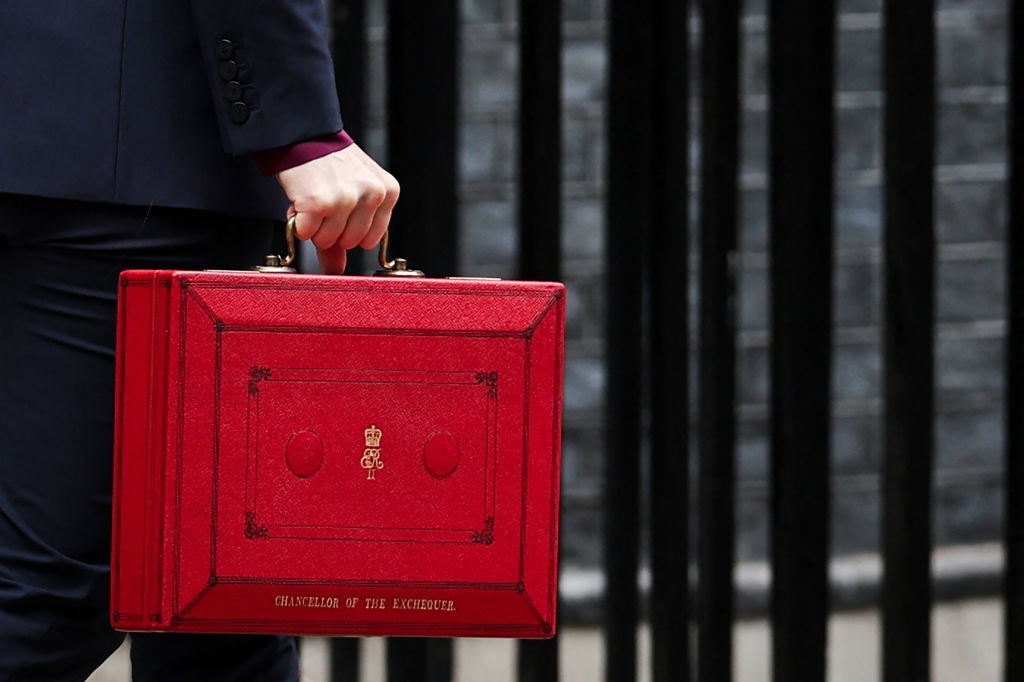
Get the latest financial news, insights and expert analysis from our award-winning MoneyWeek team, to help you understand what really matters when it comes to your finances.
You are now subscribed
Your newsletter sign-up was successful
Want to add more newsletters?

Twice daily
MoneyWeek
Get the latest financial news, insights and expert analysis from our award-winning MoneyWeek team, to help you understand what really matters when it comes to your finances.

Four times a week
Look After My Bills
Sign up to our free money-saving newsletter, filled with the latest news and expert advice to help you find the best tips and deals for managing your bills. Start saving today!
“When the facts change”, John Maynard Keynes is believed to have said, “I change my mind. What do you do?”
The answer from chancellor Rishi Sunak would seem to be: “just about anything so long as it cannot be described as a U-turn”.
The case for a U-turn is clear. In September, the government appeared to be faced with three crises. Firstly, the extravagant spending of the pandemic had resulted in record fiscal deficits (it had spent more than it took in in taxes – a lot more), threatening to push the national debt-to-GDP ratio through 100%.
MoneyWeek
Subscribe to MoneyWeek today and get your first six magazine issues absolutely FREE

Sign up to Money Morning
Don't miss the latest investment and personal finances news, market analysis, plus money-saving tips with our free twice-daily newsletter
Don't miss the latest investment and personal finances news, market analysis, plus money-saving tips with our free twice-daily newsletter
Secondly, the media was clamouring for the funding of care for the elderly, deemed to be a “crisis” to be addressed at minimal cost to the recipients. Finally, the numbers on NHS waiting lists had grown from 2.3 million in 2009 and 4.4 million before the pandemic to over six million. The health secretary, Sajid Javid, was warning that they could reach 13 million.
Sunak duly announced a £12bn increase in National Insurance, raising it from a combined 25.8% of pay above £9,500 per year to 28.3%. This was to fund first a reduction in the NHS waiting lists, then social care.
In addition, personal tax allowances and the threshold for higher tax rates had been frozen until at least the 2025-2026 tax year, and the rate of corporation tax increased from 19% to 25%. The result was the highest tax burden for 71 years, according to the Taxpayers Alliance.
Believe it or not, the public finances are in better shape than you might think
Since September, much has changed. In February, Javid admitted that NHS waiting lists would go on rising till at least 2024. Since the extra funding would have no effect, why not postpone it until NHS management came up with a plan to justify it?
The number of elderly people living in care homes in the UK is nearly 500,000, equivalent to 4% of the population who are over 65, and 15% of the over-85s. Despite an ageing population, this number peaked at around 560,000 in the late 1990s so the central tenet of the “crisis,” that demand was and would rise remorselessly, is incorrect.
The population is ageing but the elderly are more able to look after themselves than ever before, helped by the growth of supported living (housing developments for the elderly), on-line monitoring and home visits. It is not obvious that care homes increase life expectancy of just two-and-a-half years on admission and the experience of the pandemic is unlikely to have increased demand. Was the “crisis” exaggerated?
Finally, the public finances are in better shape than the Office for Budget Responsibility (OBR) had forecast, with the 2021-2022 deficit now expected to undershoot by £20bn. This forecast was reduced in October from £234bn to £183bn and the 2025-2026 forecast from £74bn to £46bn. These are likely to be cut further.
As a result, current government debt is likely to emerge at around 95% of GDP, about 10% higher than before the pandemic. From here it is expected to fall, partly as the annual deficit falls but more due to inflation, to 83.5% next year and 80% in 2026-2027.
Despite much angst about the rising cost of servicing the national debt, inflation is eroding it rapidly. The yield on ten-year gilts is currently 1.7% and the rate of inflation is 6.2%. This means that the real burden of debt is being reduced at an annual rate of nearly £100bn.
Unsurprisingly, the falling deficit is not due to spending restraint but rising tax receipts. The OBR points to higher receipts from income tax (frozen allowances and thresholds), corporation tax (rising rates), and VAT (notably on petrol and domestic fuel), but there is more. Death duties are increasing at 20% a year, as are capital gains tax receipts, while customs duties are up 63% in the last year. Stamp duty receipts fell 19% in the pandemic year of 2020-2021 but are now soaring.
The chancellor should have ditched the National Insurance rise
This led economist Roger Bootle to argue that rescinding the announced increases in National Insurance “would be exactly the right thing to do. It makes no sense to be hitting the economy with such huge tax rises. There is no necessity for borrowing and debt to be brought down at precisely the pace that the Treasury seems to think necessary.”
But that would represent too much of a U-turn. Instead, the government is gambling that voters will be so grateful for pre-election tax cuts that they will forget the massive increases that preceded it and that they will vote for the High Tax Party in preference to the Even Higher Tax Party.
The chancellor strongly resisted calls for the 5% rate of VAT on domestic fuel to be rescinded or suspended as that would mean losing the increased receipts on higher prices. Instead, the government introduced a bizarre £150 council tax rebate and a £200 loan to be repaid over five years – or maybe not. The council tax rebate only applies to homes in the A-D bands, but it does apply to second homes.
The measures announced in the actual statement are modest. A temporary 5p cut in fuel duty is less than the extra VAT (about 7p a litre) levied on the higher pre-tax price of petrol. The rise in the National Insurance payment threshold to £12,570 (the same as for income tax) is very welcome, but does not affect the threshold for employers’ contributions. These raise employment costs and thus depress pay settlements. Ultimately it is paid for by employees.
The pledge to cut the basic rate of income tax by one penny in the pound to 19p is driven by the “no U-turns” dogma. A reversal of the increase in National Insurance would have made much more sense.
The direct implications of the measures for investors are minimal but the prospect of steadily improving public finances, a trend that is likely to continue even as economic growth slows, provides a positive backdrop for the economy, inflation and markets.
The pressure for extra spending and mis-spending will continue, notably on defence and, ad infinitum, on the NHS, but the electoral clock is ticking so the government’s priority will be cutting taxes. Investors will soon need to start worrying about the implications of a change of government in 2024. That would bring plenty of U-turns.
Get the latest financial news, insights and expert analysis from our award-winning MoneyWeek team, to help you understand what really matters when it comes to your finances.

Max has an Economics degree from the University of Cambridge and is a chartered accountant. He worked at Investec Asset Management for 12 years, managing multi-asset funds investing in internally and externally managed funds, including investment trusts. This included a fund of investment trusts which grew to £120m+. Max has managed ten investment trusts (winning many awards) and sat on the boards of three trusts – two directorships are still active.
After 39 years in financial services, including 30 as a professional fund manager, Max took semi-retirement in 2017. Max has been a MoneyWeek columnist since 2016 writing about investment funds and more generally on markets online, plus occasional opinion pieces. He also writes for the Investment Trust Handbook each year and has contributed to The Daily Telegraph and other publications. See here for details of current investments held by Max.
-
 Can mining stocks deliver golden gains?
Can mining stocks deliver golden gains?With gold and silver prices having outperformed the stock markets last year, mining stocks can be an effective, if volatile, means of gaining exposure
-
 8 ways the ‘sandwich generation’ can protect wealth
8 ways the ‘sandwich generation’ can protect wealthPeople squeezed between caring for ageing parents and adult children or younger grandchildren – known as the ‘sandwich generation’ – are at risk of neglecting their own financial planning. Here’s how to protect yourself and your loved ones’ wealth.
-
 Is Britain heading for a big debt crisis?
Is Britain heading for a big debt crisis?Opinion Things are not yet as bad as some reports have claimed. But they sure aren’t rosy either, says Julian Jessop
-
 When is the Autumn Budget and what should you expect?
When is the Autumn Budget and what should you expect?Chancellor Rachel Reeves is set to deliver her second Autumn Budget next week – but what exactly does the fiscal event involve?
-
 Conservatives pledge to cut National Insurance again – how much could you save?
Conservatives pledge to cut National Insurance again – how much could you save?News A 2p reduction in National Insurance is a key feature of the Tory’s general election manifesto.
-
 UK wages grow at a record pace
UK wages grow at a record paceThe latest UK wages data will add pressure on the BoE to push interest rates even higher.
-
 Trapped in a time of zombie government
Trapped in a time of zombie governmentIt’s not just companies that are eking out an existence, says Max King. The state is in the twilight zone too.
-
 America is in deep denial over debt
America is in deep denial over debtThe downgrade in America’s credit rating was much criticised by the US government, says Alex Rankine. But was it a long time coming?
-
 UK economy avoids stagnation with surprise growth
UK economy avoids stagnation with surprise growthGross domestic product increased by 0.2% in the second quarter and by 0.5% in June
-
 Bank of England raises interest rates to 5.25%
Bank of England raises interest rates to 5.25%The Bank has hiked rates from 5% to 5.25%, marking the 14th increase in a row. We explain what it means for savers and homeowners - and whether more rate rises are on the horizon
